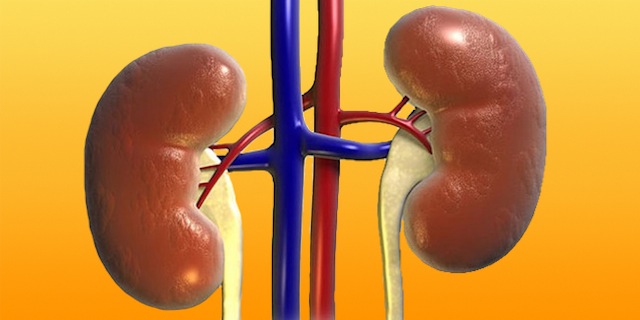A guy is in a line of patients trying to get released from a mental institution. He watches as the others go in to meet with the doctor and hears the questions the doctor asks: “point to your right arm,” “point to your stomach,” “point to your toes,” “point to your knee,” and so on. He sees which answers are correct, and which answers are wrong. When it’s his turn, the guy sits down with the doctor and answers each question perfectly. The doctor’s amazed, and asks: “How were you able to answer all those questions correctly?” The guy points to his head and replies: “Kidneys, man! Kidneys!”
Kidneys–What do they do?
Thinking about kidneys isn’t what most people do. Bladders however, do come to mind when you need to pee. What do kidneys do? How is urine created?
It all starts with eating and drinking. The process of eating and digesting food produces waste that ends up in your bloodstream. The kidney is one of the organs that filters or cleans-up blood in the body. In the process, the kidneys regulate the amount of fluid in your blood. It may be hard to believe but these two organs (kidneys come in pairs) are about the size of your fist, yet they filter all the blood in your body 20 to 25 times each day.
Kidneys also correct electrolyte levels– sodium, chloride, potassium and bicarbonate– in the body keeping them in balance. The kidneys even produce the enzyme, renin, that regulate blood pressure, Erythropoietin, which helps stimulate in the production of red blood cells and an active form of Vitamin D which keep bones strong.
Each kidney is made up of about a million tiny structures called nephrons. Nephrons are long, extremely fine tubes. One end of the tube  is folded up on itself forming a cuplike capsule where tiny arteries cluster. This part of the nephron is called the glomerulus. This is where excess fluids and wastes that are in the blood are filtered out. The excess fluid flows out of the blood through the inner wall of the cuplike capsule.
is folded up on itself forming a cuplike capsule where tiny arteries cluster. This part of the nephron is called the glomerulus. This is where excess fluids and wastes that are in the blood are filtered out. The excess fluid flows out of the blood through the inner wall of the cuplike capsule.
The other end of the nephron tubule is a collecting tubule that connects to a part of the kidney called the renal pelvis. From the renal pelvis the excess fluid and waste goes to the bladder and eventually passes out of the body. Between one and two quarts of urine are produced every day.
Why this long discussion about an organ I don’t really want to think about?
Because if your kidneys don’t work properly, waste and extra water stay in the bloodstream. People with diabetes are at risk for kidney failure–nearly thirty percent of people with type 1 diabetes and between ten and forty percent of people with type 2 diabetes develop kidney failure. Excess sugar in the bloodstream actually coats the blood cells making them sticky and stiff. Sticky blood cells clog blood vessels and damage the tiny, fragile blood vessels that make up the glomerulus of the kidneys.
If kidney disease is diagnosed early, it may be possible to stop it and fix the damage. But, if the disease continues, unchecked, the damage may not be reversible. Since early kidney disease has no symptoms, being able to find out or predict if someone with diabetes is developing kidney disease is critical to helping save lives. A recent 2014 study suggests one test that may indicate the development of kidney disease. In this study, researchers followed patients with type 2 diabetes for 3 years. At the beginning of the study, they tested these patients for uric acid in the bloodstream.
Uric acid is a byproduct of digestion and is one of the waste products filtered by the kidneys. A person has a “normal” uric acid test if they have 8 mg/dL or lower in their bloodstream. In this study, all of the patients had normal uric acid levels. The researchers divided the patients into 4 groups based on their uric acid levels. At the end of the 3 years, those who had had the highest normal levels at the beginning of the study were three times more likely than the others to progress to chronic kidney disease.
The important thing for people with diabetes is to ask your physician about monitoring your kidney function and to ask how you can reduce your risk of developing kidney disease. Keeping your kidneys happy is essential. “Kidneys, man! Kidneys!”
To see a synopsis of the featured article, go to our sample library.







Wow because this is very helpful job! Congrats and keep it up.|
Kidding about your kidneys are no joke.